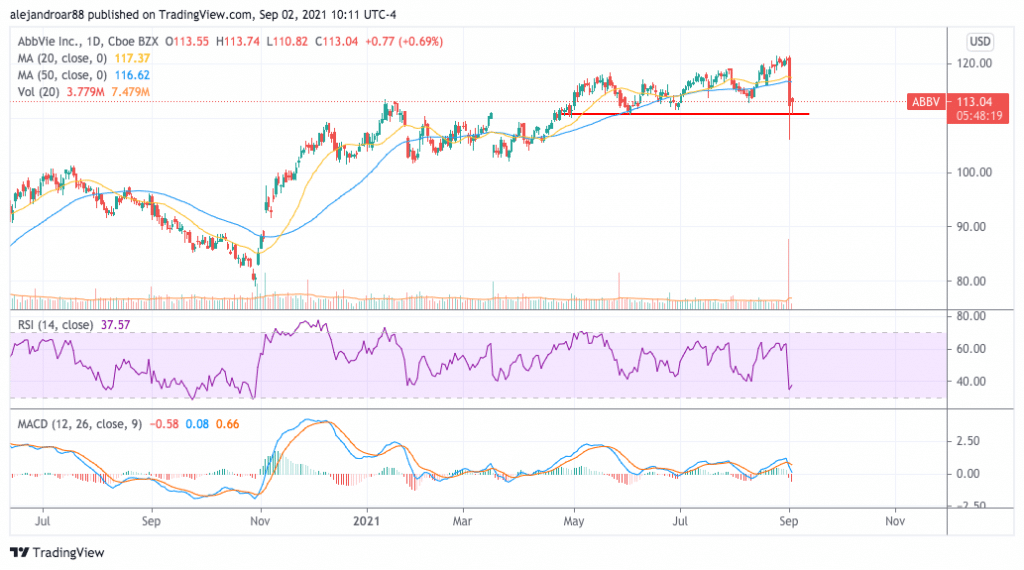AbbVie Stock Down 7% in September – Time to Buy ABBV Stock?
Please note that we are not authorised to provide any investment advice. The content on this page is for information purposes only.
The price of AbbVie stock has gone down 7% so far in September as a result of yesterday’s pronounced decline caused by a mandate from the US Food and Drug Administration (FDA) to include severe warnings on the company’s arthritis treatment Rinvoq.
The agency stated that upon performing a randomized safety clinical trial of Xeljanz and Xeljanz XR – two arthritis drugs produced by Pfizer (PFE) – it concluded that there were serious risks for patients of experiencing heart-related events including heart attacks, strokes, cancer, blood clots, and even death.
Even though this particular drug accounts for only a small portion of AbbVie’s revenues as reflected by data from the company’s latest quarterly report, market participants may fear that this mandate could also affect other more important treatments commercialized by the company such as Humira.
Meanwhile, so far this morning, shares of AbbVie are dropping almost 1% in early stock trading action.
Could this downtick result in a swift reversal of the stock’s latest uptrend? In the following article, I’ll discuss the latest price action while also assessing the firm’s fundamentals to outline plausible scenarios for the third quarter of 2021.
67% of all retail investor accounts lose money when trading CFDs with this provider.
AbbVie Stock – Technical Analysis

Yesterday’s trading volumes reflect how concerned market participants appear to be as a result of this FDA mandate. In this regard, nearly 51 million shares exchanged hands during the day – a figure that exceeded ABBV’s 10-day average volumes by more than 10 times.
Moreover, this resulted in a severe plunge in both the Relative Strength Index (RSI) and the MACD, with the two momentum oscillators now sending potential sell signals.
The MACD has just drifted below the signal line on the back of a second consecutive negative histogram reading while the RSI has dived to its lowest levels since October 2020.
Additionally, the price has broken below the stock’s short-term moving averages while it broke below the 200-day moving average during intraday action to then settle above this important support.
Meanwhile, today’s price action has already tagged this important long-term moving average again and traders should keep an eye on how the price behaves moving forward as a break below this threshold could result in the beginning of a pronounced downtrend for ABBV stock catalyzed by these negative news.
It is important to note that even though the trials conducted by the FDA that led to these findings did not directly evaluated Rinvoq (ABBV’s drug), the agency concluded that due to the similarity of their mechanisms of action with those of Pfizer’s drugs Rinvoq could also produce the same side-effects.
Moving forward, if AbbVie conducts a study that refutes this assumption, chances are that the stock could bounce swiftly as it would clear the air for the company.
Meanwhile, the similarity of Rinvoq with AbbVie’s flagship arthritis treatment Humira is the reason why the stock is dropping this much as Humira accounted for 43% of AbbVie’s net adjusted revenues in 2020.
AbbVie Stock – Fundamental Analysis
Sales of AbbVie have nearly doubled in the past four years, moving from $25.64 billion to $45.8 billion from 2016 to 2020 at a compounded annual growth rate (CAGR) of 15.6%.
The immunology segment is the most important one for the company and Humira has progressively become the company’s most important individual treatment and a major driver of its growth.
Moving forward, analysts were forecasting a 23% jump in the company’s sales for 2021 and a subsequent 6.2% increase in the firm’s top-line results in 2022. However, this latest development could lead to a slowdown in the firm’s revenue growth if sales of Humira and Rinvoq are affected by the FDA’s decision.
Moreover, Rinvoq emerged as a plausible substitute to Humira and, since its average price is markedly higher, it may have boosted the firm’s top-line growth in the future.
However, these prospects may now be reviewed by analysts amid this FDA mandate and that could lead to price target cuts and changes in their recommendation for the stock. In this regard, just yesterday, an analyst from SVB Leerink lowered his price target for AbbVie from $148 to $142 per share.
Currently, the consensus price target for the stock stands at $123 per share while the consensus recommendation for AbbVie stock is buy with 14 out of 17 analysts currently surveyed by MarketBeat holding a buy rating for the issue.
The combination of weak technical indicators and potential upcoming price target revisions reinforce a bearish outlook for this pharmaceutical stock.






